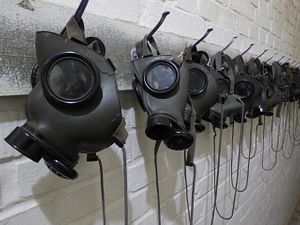Amid growing pessimism about the state of international negotiations with North Korea over denuclearization, Japan is seeking to shine a light on the regime’s other weapons of mass destruction.
Japanese Defense Minister Itsunori Onodera traveled to the Netherlands this week to meet with the head of the Organization for the Prohibition of Chemical Weapons (OPCW), Fernando Arias González. Onodera emphasized the “extremely important” role that the OPCW would play in the event that North Korea made any tangible moves toward abandoning its weapons.
“I believe that no concrete decisions have been made about the way that verification will be carried out on North Korea’s abandonment of weapons of mass destruction, and through which framework,” Onodera conceded at a media conference on September 4.
“However, at the very least, OPCW will fulfill an important role as an international organization. Of course, it is important that the verification of whether or not North Korea has truly disposed of its weapons of mass destruction is carried out by a third party and not a single country. Doing so through an international organization makes the process more objective.”
Japan would also offer strong cooperation with the OPCW because the country had relevant expertise to share, Onodera added.
“We have knowledge of many chemical weapons, including knowledge gained through the Tokyo subway sarin attack” that was carried out by the Aum Shinrikyo cult in 1995, he said. “Hence, in order to apply and utilize this knowledge, we would like to make the necessary preparations so that inspectors can be dispatched from Japan in the future.”
The visit came a week after the release of Japan’s annual defense white paper, which summed up Tokyo’s concerns about North Korea’s chemical and and biological weapons as follows:
North Korea is suspected to have several facilities capable of producing chemical agents and already a substantial stockpile of such agents. North Korea is also thought to have some infrastructure for the production of biological weapons. The possibility cannot be denied that North Korea is able to load biological and/or chemical weapons on ballistic missiles.
As previously reported, the defense white paper also reaffirmed North Korea still posed a serious and imminent threat to Japan’s security. The flurry of international negotiations since the start of the year has not altered Tokyo’s fundamental assessment of the danger posed by Pyongyang’s nuclear weapons and ballistic missiles.
That white paper paved the way for Japan’s defense ministry to request – a few days later – a record budget for next fiscal year. The ministry is seeking 5.3 trillion yen ($47.6 billion) for the year starting April 2019, reflecting a 2.1 percent rise year-on-year, according to details of the budget proposal released on August 31. The total amount relating to ballistic missile defense is 424 billion yen, Kyodo News reported.
Tokyo will be watching closely for any outcomes from the third summit between North Korean leader Kim Jong Un and South Korean President Moon Jae-in, scheduled to be held in Pyongyang from September 18 to 20. The meeting follows a recent decision by U.S. President Donald Trump to cancel a planned trip to North Korea by Mike Pompeo, the secretary of state, on the grounds of insufficient progress toward denuclearization. Japan has argued against any easing of sanctions at the current time.
While in the Netherlands, Onodera also paid a visit to the Dutch minister of defense, Ank Bijleveld, and the issue of North Korea remained high on the agenda. It was the first defense ministerial meeting since a memorandum on Japan-Netherlands defense cooperation was signed in 2016. Onodera noted that the Netherlands currently served as chair of the UN Security Council Sanctions Committee on North Korea. The Japanese minister again raised concerns about illicit ship-to-ship transfers of oil and other resources involving North Korean vessels.
“I concurred with Minister of Defense Bijleveld on the point that the sanctions must not be eased as long as North Korea does not make any concrete progress toward complete denuclearization,” Onodera told reporters. The Japanese minister added that it was “important to continue demanding for the strict enforcement” of the existing UN sanctions on North Korea.

































